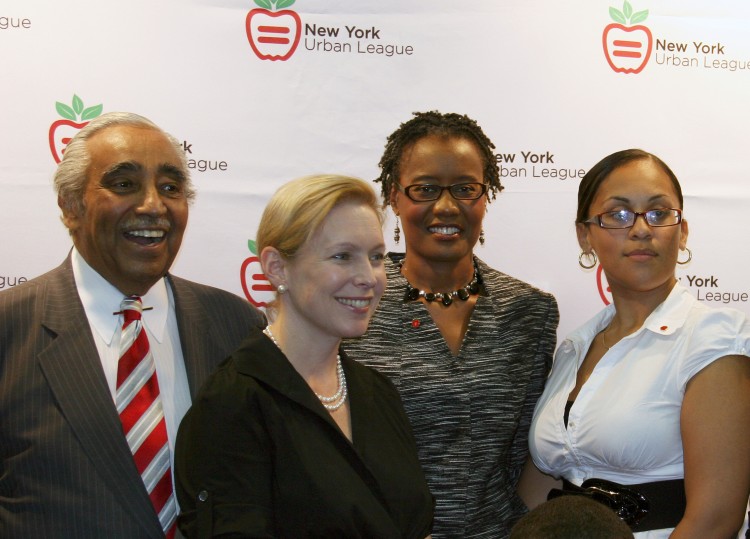U.S Sen. Kirsten Gillibrand promoted the Urban Jobs Act legislation that would help provide job training, educational programming, and support services, in three separate stops on Tuesday, in Harlem, the Bronx, and Queens.
“Supporting education and training for our city’s youth is a smart investment that will help rebuild our local economy and pay dividends over the long term,” Gillibrand stated in a prepared release. “Helping our youth compete in this difficult economy will have a lasting positive impact on our community,” added Gillibrand.
In Harlem, Congressman Charles Rangel, and Assemblyman Keith Wright, along with representatives from both the National Urban League (NUL) and the New York Urban League (NYUL) spoke about the legislation.
More than one-third of the nation’s minority youth are currently unemployed.
Sen. Gillibrand was joined by Assemblyman Carl Heastie and Bronx clergy leaders at a roundtable discussion in the Bronx to discuss the need for legislation that would assist at risk Bronx youth in finding jobs.
Make the Road New York, a nonprofit that helps the Latino community, was represented by Executive Director Ana Maria Archila, and is an organization that would qualify for a grant under the UJA. Assemblyman Fransisco Moya, Sen. Jose Peralta, and City Council members also attended the event in Queens.
“It is one thing to lose your job, and another to never have had one at all,” said Arva Rice, president and CEO of the NYUL at the press conference in Harlem “For young New Yorkers with few skills, contacts, and options hope can be lost.”
The UJA would provide funding for nonprofit organizations that have job training programs for youth, with an eye on second-chance youth; those who have had a child, an interaction with the criminal justice system, or have dropped out of school.
The Community Service Society of New York December 2010 report about unemployment found that young black males were particularly hard hit, only one in four in the 16–24 age group held a job during the period from January 2009 to June 2010, while unemployment jumped to 52 percent for those without a high school or equivalent diploma.
“The Urban Jobs Act creates opportunities for youth to receive job training, placement, and opportunities that will ensure that they become successful and contributing members of the community,” said Rice.
The legislation would award competitive grants to national nonprofits that would train youth ages 18-24 in partnership with local affiliates.
“If you want to create jobs in Harlem, you’ve got to plant seeds in Harlem,” said Marc Morial, president of NUL. “The Urban Jobs Act is all about planting seeds, not only in Harlem, but in major urban communities throughout New York, whether it’s Buffalo, or Utica, or Rochester.”
As federal legislation it will have the potential to impact urban communities like Pittsburgh, Philadelphia, Portland, and L.A., added Morial.
Next...Staten Island Youth Seek Solutions
Staten Island Youth Seek Solutions
A group of Staten Island youth, part of NYUL’s Absolute Success Program, traveled to the press conference, as they are facing similar issues in their North Shore community.
They have been conducting research and putting together a survey “to see how each and everyone is affected by each question” said 17-year-old Madea. Sections on the current draft include racism, teen pregnancy, low graduation rates, and youth violence, with questions like: “Do you think your nationality effects your employment?” and, “Do you believe teen pregnancy contributes to low graduation rates?”
The survey is still being finalized; the group plans to begin distribution on Thursday to whoever is interested in filling it out. They will deliver the results to the press so as to give insight into what kind of help the community needs. They hope the survey will end in active problem solving.
Kyle, who is 15 and will be a junior this year, said that while all ages are having trouble finding employment on Staten Island, youth have been impacted the worst. He went all around the island seeking work this summer, but was either told he was too young or that help was not needed.
Following the morning press conference, the Harlem Renaissance High School was visited by the youth for computer training as an example of a place that would be eligible for a grant under the UJA.
The school hosts computer training related to employment, such as using Microsoft Office, Excel, Word, and Powerpoint programs.
Morial met with the students at the school, learned about the survey, listened to their concerns, and asked them where they wanted to go to college.
“We want to be successful in life,” said one youth, “but if we don’t have the skills and opportunities, then how are we supposed to be successful?”
Some of the high school students shared their aspirations to attend colleges like Columbia, MIT, and CUNY, to study subjects like nursing, architecture, and computer science.








Friends Read Free